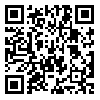Volume 6, Issue 4 (Winter 2024)
Iran J Health Insur 2024, 6(4): 256-265 |
Back to browse issues page
Research code: 162348303
Download citation:
BibTeX | RIS | EndNote | Medlars | ProCite | Reference Manager | RefWorks
Send citation to:



BibTeX | RIS | EndNote | Medlars | ProCite | Reference Manager | RefWorks
Send citation to:
Salehi S, Nourollahzadeh N, Jafari S M. A Hybrid Fuzzy QFD Approach to Evaluating the Financing Policies of Universal Health Coverage in Iran. Iran J Health Insur 2024; 6 (4) :256-265
URL: http://journal.ihio.gov.ir/article-1-297-en.html
URL: http://journal.ihio.gov.ir/article-1-297-en.html
1- Department of Finance, Faculty of Economics and Accounting, South Tehran Branch, Islamic Azad University, Tehran, Iran
2- Department of Finance, Faculty of Economics and Accounting, South Tehran Branch, Islamic Azad University, Tehran, Iran ,nour547@yahoo.com
2- Department of Finance, Faculty of Economics and Accounting, South Tehran Branch, Islamic Azad University, Tehran, Iran ,
Abstract: (1715 Views)
Introduction: One of the fundamental challenges faced by various societies is the easy and affordable access to healthcare services. In this context, a plan known as Universal Health Coverage was proposed by the World Health Organization, prompting diverse countries to implement various measures in response. A critical need for the execution of this plan is the availability of sufficient financial resources. Therefore, this research aims to identify and evaluate financing policies for Universal Health Coverage.
Methods: This study first reviews recent research literature, followed by conducting focused group interviews with research experts. After identifying stakeholders' needs and various policies, the policies were weighted and prioritized using a Fuzzy Quality Function Deployment (QFD) approach. To enrich the data for the Fuzzy QFD questionnaire, insights from 18 experts with at least five years of experience in insurance and macroeconomic policies were utilized.
Results: The research findings indicate that the number of insured individuals and the percentage of services covered by insurance are the most critical needs of the system's stakeholders. Accordingly, reducing the insurance service copayment rate, stratifying the number of insured individuals, and allocating a portion of the base insurance share to private insurance companies are prioritized in the identified policies.
Conclusion: Based on the study's findings, it is concluded that for the government to provide sustainable health services to the public, the private sector should also be involved to bear the service provision costs in exchange for appropriate revenue. Health services should be stratified to meet varied needs effectively.
Methods: This study first reviews recent research literature, followed by conducting focused group interviews with research experts. After identifying stakeholders' needs and various policies, the policies were weighted and prioritized using a Fuzzy Quality Function Deployment (QFD) approach. To enrich the data for the Fuzzy QFD questionnaire, insights from 18 experts with at least five years of experience in insurance and macroeconomic policies were utilized.
Results: The research findings indicate that the number of insured individuals and the percentage of services covered by insurance are the most critical needs of the system's stakeholders. Accordingly, reducing the insurance service copayment rate, stratifying the number of insured individuals, and allocating a portion of the base insurance share to private insurance companies are prioritized in the identified policies.
Conclusion: Based on the study's findings, it is concluded that for the government to provide sustainable health services to the public, the private sector should also be involved to bear the service provision costs in exchange for appropriate revenue. Health services should be stratified to meet varied needs effectively.
Type of Study: Research |
Subject:
Special
Received: 2023/11/8 | Revised: 2024/04/20 | Accepted: 2024/01/31 | ePublished: 2024/02/27
Received: 2023/11/8 | Revised: 2024/04/20 | Accepted: 2024/01/31 | ePublished: 2024/02/27
Send email to the article author
| Rights and permissions | |
 |
This work is licensed under a Creative Commons Attribution-NonCommercial 4.0 International License. |






